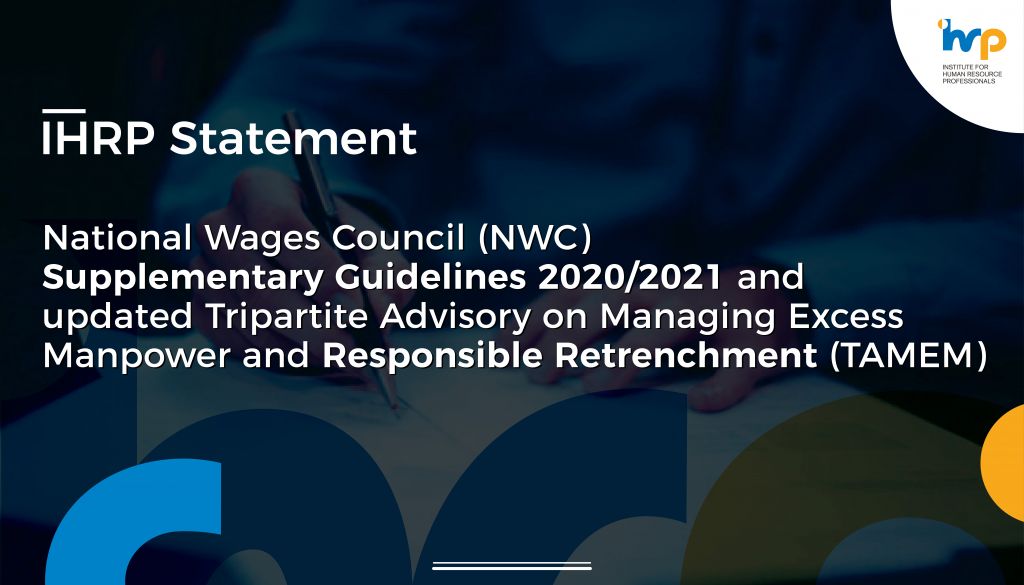
IHRP Statement on National Wages Council (NWC) Supplementary Guidelines 2020/2021 and updated Tripartite Advisory on Managing Excess Manpower and Responsible Retrenchment (TAMEM)
IHRP supports the NWC Supplementary Guidelines 2020/2021 that were issued last week. HR professionals play a key role to support their organisations to navigate through a challenging business environment using a range of human resource levers such as a Flexible Wage System to minimise retrenchments to the greatest extent possible.
Consider a Longer-Term Horizon
COVID-19 has re-shaped the world of work. HR professionals can support companies in taking a longer-view to position themselves and their employees to emerge stronger and more resilient from the crisis. What are the workforce capabilities critical for the company to preserve or build up for the post-COVID-19 economy? Which jobs or business functions need to be restructured? As far as possible, HR professionals should retain existing employees through appropriate cost-saving measures, or explore alternatives to retrenchments. They should identify the areas of critical capabilities and retain their employees to take on new jobs in restructured business functions.
Some tips on gaining a competitive advantage for your business can be found here. Employers can also consider accelerating the formation of Company Training Committee (CTC).
Implement Responsible Cost Saving Measures
If your company faces significant cost pressures and poor business prospects, you should explore non-wage cost-saving measures such as reduced working hours, especially in sectors where there is less demand e.g. travel-related. This will allow employees to consider taking on part-time work in other sectors to help make ends meet. Many organisations have also implemented early retirement, voluntary retirement, voluntary separation schemes. Others have introduced part time work, job sharing, job swapping to reskill, that may help with the current situation beyond just pay. You should also encourage short or extended leave of absences without pay as organisations may want their talents back at some point. Finally, organisations should make full use of Government support measures (including training schemes) before implementing wage cuts.
Implement A Flexible Wage System (FWS)
In cases where temporary wage cut is necessary to keep the business going and minimise retrenchments, HR professionals should implement a flexible wage structure with the support from all employees. The temporary adjustments to employees wages during this difficult period will not only allow employers to preserve jobs for all but also maintain their capacity for eventual business recovery. Employees need full transparency and advanced information so that they can better prepare themselves.
A useful resource guide to implement a Flexible Wage System (FWS) can be found here.
The key salient principles highlighted by NWC to guide implementation of wage cuts include:
a. Utilise the range of flexibility under the Flexible Wage System (FWS). If necessary, consider temporary adjustment of basic wages if variable components have already been adjusted.
b. Employers should adopt the FWS immediately, if have not done so, and treat any wage cuts as adjustments to a new variable component
c. Management to take earlier and deeper wage cuts
d. Employers that pay Annual Wage Supplement to endeavour to continue doing so
e. Employers in deciding a reasonable level of wage cut, to take into account the sector’s and company’s performance and outlook, level of Government support, cumulative effect of prior wage cuts and other cost-saving measures already implemented, impact on employees finances and whether employees continue to contribute to full or longer working hours
f. Negotiate and agree on wage adjustments and FWS implementation with relevant unions. For non-unionised companies, to keep communications with employees proactive and transparent.
Conduct Responsible Retrenchment
Retrenchments should be at the last resort and where it is necessary, HR professionals should conduct retrenchments in a fair, responsible and sensitive manner. They should adhere to the updated Tripartite Advisory on Managing Excess Manpower and Responsible Retrenchment (“the Tripartite Advisory”), which the NWC has endorsed.
Conclusion
The above summarises the pertinent NWC guidelines for HR professionals to consider as they steer their organisations’ human capital challenges during this period. HR professionals should refer to the NWC Supplementary Guidelines for a comprehensive set of guidelines including those related to low-wage workers, Progressive Wage Model (PWM) and Self-Employed Persons (SEPs).
Attachments:
- NWC Supplementary Guidelines 2020/2021
- NWC Supplementary Guidelines 2020/2021 Infographic
- Responsible Retrenchment Practices Checklist


